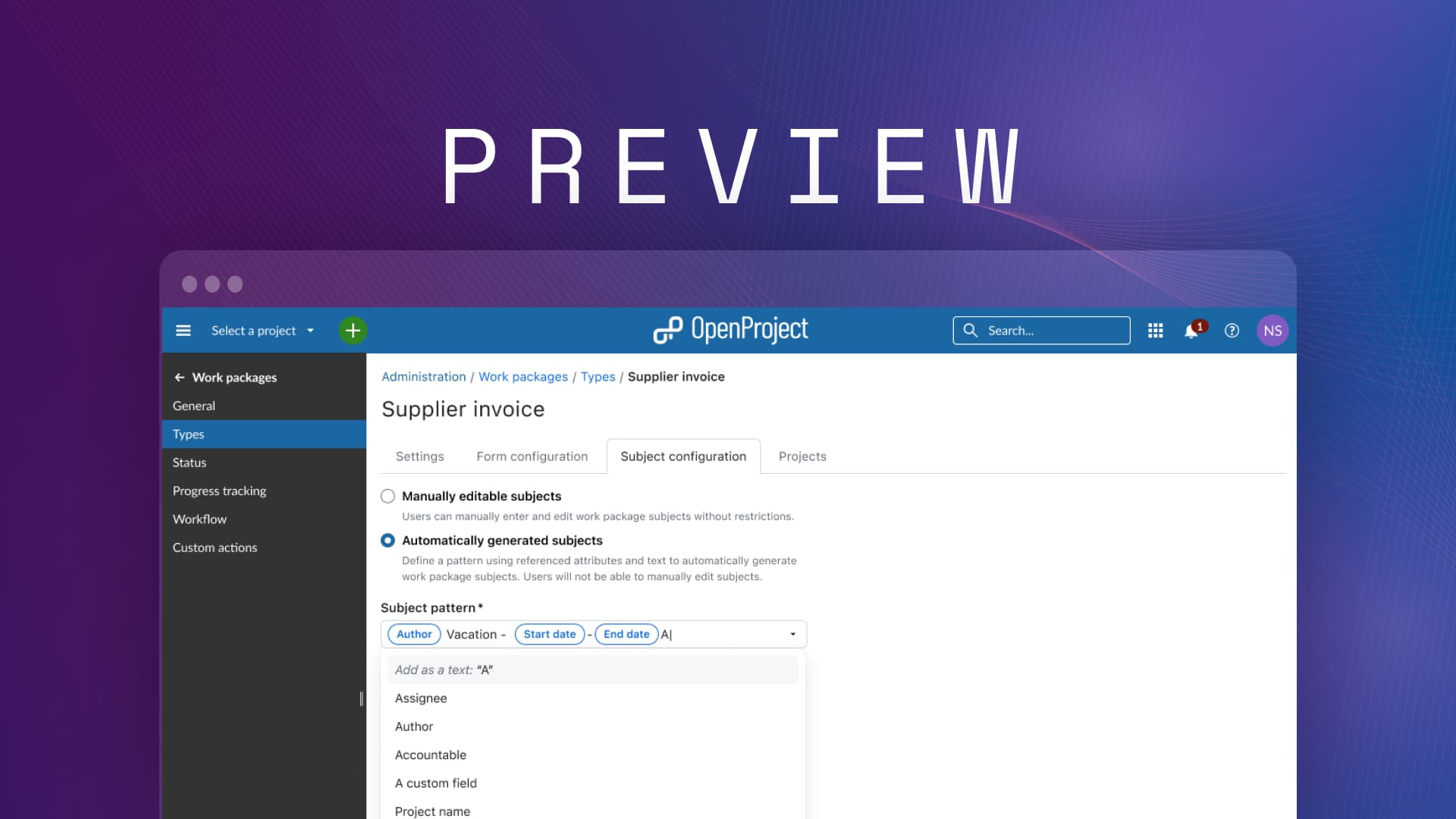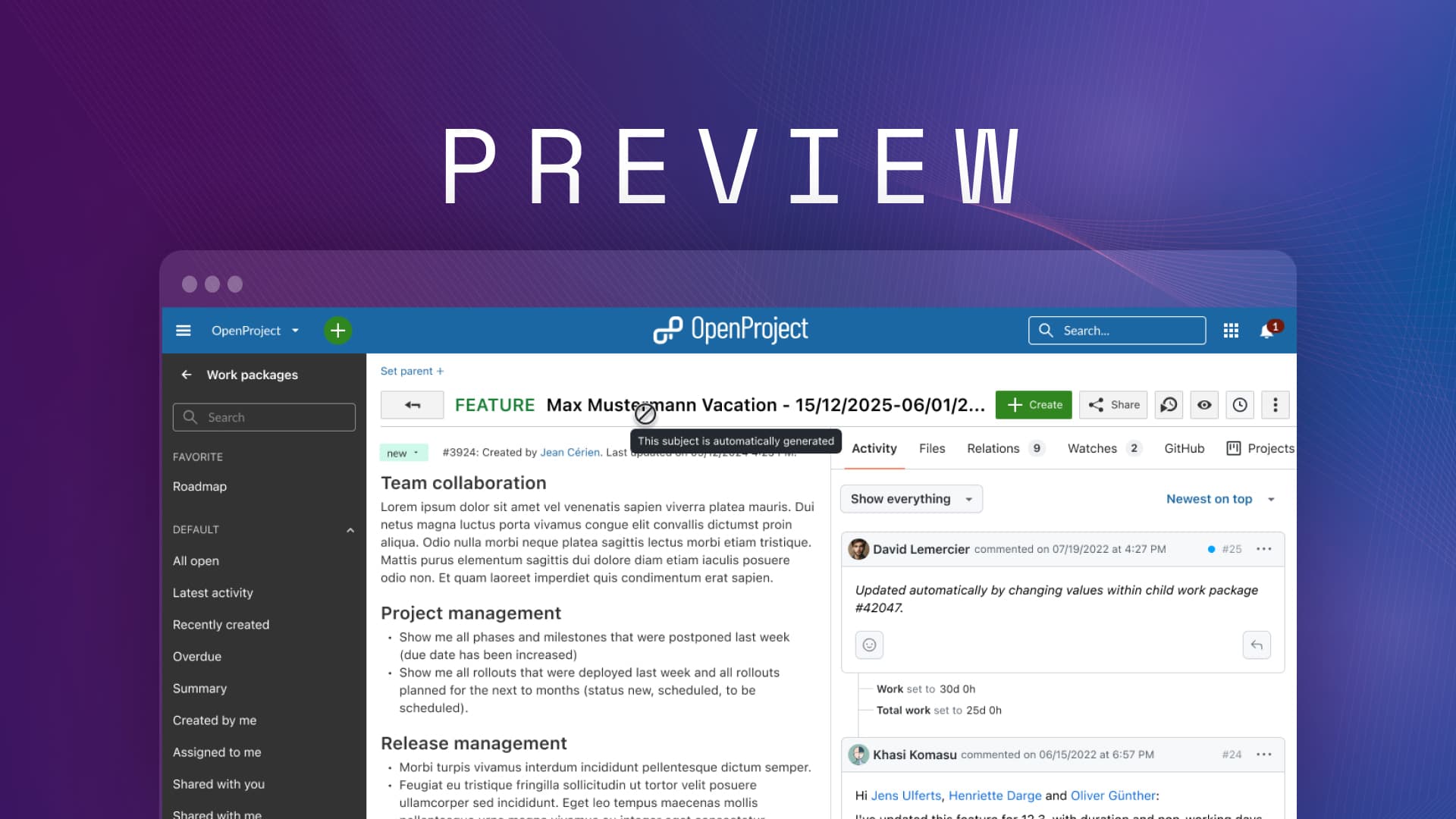
Standardize your task names with automatically generated work package subjects
Teams rely on clear and structured task names to stay organized, but manual naming often leads to inconsistencies. OpenProject’s upcoming feature, Automatically generated work package subjects, ensures work packages follow predefined naming rules. This improves searchability, reduces errors, and saves time. Read on to learn how it works — along with ready-to-use subject patterns for your workflows.
Struggling with inconsistent task names? Here’s why it matters
A well-structured project relies on clear and standardized task names. In reality, however, manually naming work packages often leads to inconsistencies. Different team members may use different formats, leave out important details, or follow outdated guidelines. Over time, this creates confusion, makes filtering and searching harder, and increases the risk of errors.
For teams that handle structured processes — such as HR processing vacation requests, finance tracking invoices, or IT logging security patches — consistent naming isn’t just helpful, it’s essential.
The solution: Automatically generated work package subjects
To solve this challenge, OpenProject will soon introduce Automatically generated work package subjects, a feature that ensures work package names follow predefined patterns — without manual input. This feature is still in development and planned for one of our upcoming releases in early 2025. However, details and the release timeline may still change.
Admins define structured naming rules
Instead of relying on users to type a subject manually, admins can then define naming patterns using placeholders such as:
- Employee name — Ensures HR requests always include the relevant person.
- Dates — Automatically adds a start and end date for structured tracking.
- Project name — Makes it easier to distinguish work packages across projects.
- Custom fields — Allows flexibility for department-specific workflows.
Whenever a user creates a work package of a specific type — such as a vacation request, supplier invoice, or IT security patch — the subject is automatically generated based on these rules. This means no more inconsistent or incomplete task names — just clear, structured, and searchable work package titles every time.
Wichtig
Please note that this feature is still in development, and some details may change before release. See the feature-related work package in our Community instance for more information on this feature.
Example: Automating vacation request subjects for HR
HR teams process numerous vacation requests every year, often requiring a clear and structured naming convention to track employee leave. Without predefined subject patterns, employees might enter inconsistent titles like:
- Vacation – Max
- Vacation Request 15-12 to 06-01
- Max Mustermann holiday leave
These inconsistencies make it difficult to filter requests, ensure compliance, and standardize approvals. Also, some subjects miss important information like the date.
With Automatically generated work package subjects, admins can define a structured naming rule to enforce consistency. For vacation requests, an HR admin could configure the following pattern:
Vacation request subject pattern: VACATION REQUEST: [Author] Vacation - [Start date] - [Finish date]

How Automatically generated work package subjects improve vacation request tracking
- An employee creates a Vacation request work package. (Note: In the screenshot, the work package type is Feature)
- Instead of manually entering a subject, OpenProject automatically generates: VACATION REQUEST: Max Mustermann 15/12/2024 - 06/01/2025
- If the employee or HR updates the request’s start or end date, the subject updates automatically to reflect the change.
Hinweis
Please note: Work package types with automatically generated subject lines cannot be edited manually.
This ensures that all vacation requests follow a uniform format, making it easier for HR teams to track and manage employee leave. With standardized subject lines, filtering and reporting become more efficient, allowing teams to quickly find requests for specific time periods. Additionally, the automated structure helps prevent missing information by ensuring that every request includes the employee’s name and the relevant dates.
Standardized subject patterns for different departments
Automatically generated work package subjects can be applied across various industries and teams. Let’s look at some example subject patterns that teams can use across different work package types.
These predefined formats help standardize naming conventions, making tracking and collaboration easier:
| Department | Example subject pattern |
|---|---|
| Human Resources | VACATION REQUEST: [Author] [Start date] - [Finish date] |
CANDIDATE INTERVIEW: [Custom Field: Candidate] with [Assignee] on [Start date] | |
| Finance & Accounting | SUPPLIER INVOICE: [Author] Invoice [Creation date] - [Custom Field: Invoice ID] |
EXPENSE REPORT: [Author] - [Custom Field: Expense Type] from [Creation date] | |
| Marketing | CAMPAIGN: [Project name] - [Custom Field: Campaign Name] Launch [Start date] |
SOCIAL MEDIA: [Author] - [Custom Field: Platform] from [Creation date] | |
| Sales | LEAD FOLLOW-UP: [Custom Field: Lead Name] (Source: [Custom Field: Lead Source]) - [Assignee] |
CONTRACT RENEWAL: [Custom Field: Client Name] expires on [Finish date] | |
| IT & Development | RELEASE: [Project name] version [Version] on [Start date] |
SECURITY PATCH: [Project name] - [Custom Field: Patch ID] on [Creation date] | |
| Project Management | MILESTONE: [Project name] - [Custom Field: Milestone Name] - Deadline: [Finish date] |
RISK ASSESSMENT: [Project name] - [Priority] - [Creation date] | |
| Facilities & Administration | MAINTENANCE: [Custom Field: Location] - [Creation date] - Requested by [Author] |
OFFICE ORDER: [Custom Field: Item Category] - [Author] - [Creation date] |
By using predefined subject patterns, teams across different departments can ensure clear, standardized work package names that make tracking and collaboration easier.
Tips on crafting your own patterns
If you don’t see exactly what you need in the list above, here’s how to create patterns tailored to your team:
1. Identify critical attributes
Ask yourself: When someone sees the title, which details do they need right away?
- Who’s involved? (Author, Assignee, Accountable, Client, Applicant)
- What’s involved? (Venue, Office, Project)
- Which date matters? (Start date, Finish date, Creation date)
- Are there key custom fields? (Invoice ID, Budget Period, Lead Name)
2. Add meaningful labels
Include short, recognizable keywords that describe the purpose at a glance:
VACATION REQUESTSUPPLIER INVOICEBUG REPORTCONTRACT RENEWAL
3. Start small and focus on impact
If you’re new to subject patterns, begin with one or two high-impact cases — perhaps work packages that frequently cause confusion, such as vacation requests or invoices.
- Prioritize what matters most — Avoid adding too many details. Keep subjects short and clear for quick identification.
- Expand gradually — Once you see the benefits, apply patterns to additional work package types.
4. Communicate the rollout
Make sure your team is aware of the new conventions. Share examples, explain the benefits, and provide guidance on how these patterns will improve workflows.
Stay tuned for automatically generated work package subjects
With Automatically generated work package subjects, OpenProject will soon introduce a great feature that will help teams save time, reduce errors, and ensure clarity in work package naming. Whether you’re managing vacation requests, invoices, or project milestones, structured subject patterns will bring more consistency to your workflows.
We’re excited to bring you this new feature soon — so stay tuned!
Want to be the first to know? Follow us on social media and subscribe to our monthly newsletter to stay up to date with OpenProject’s latest features and improvements.


